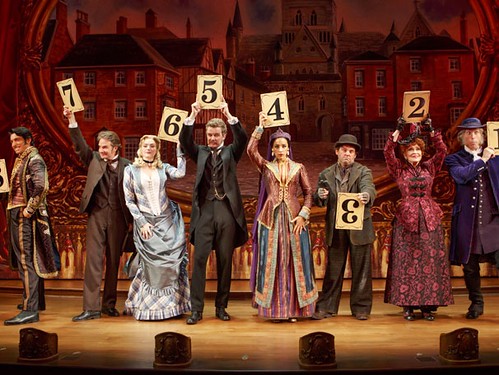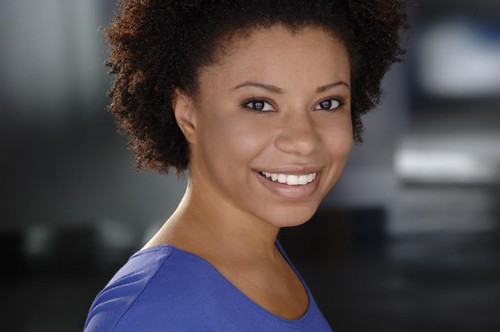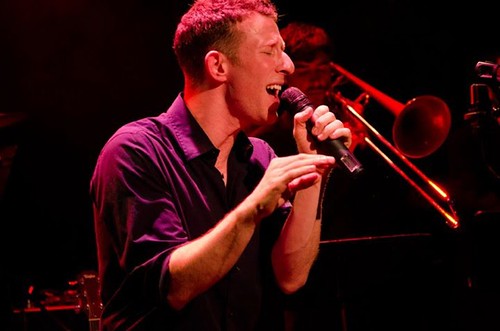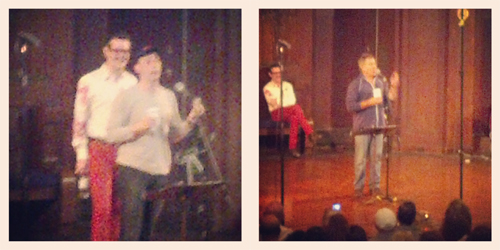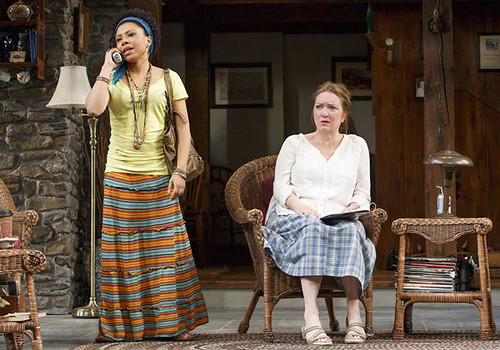
One of our favorite performances of the year? Shalita Grant’s portrayal of the psychic housemaid Cassandra in Vanya and Sonia and Masha and Spike. With a Tony nomination and a spate of other awards under her belt, this Broadway newcomer is having one hell of a season. We chatted with her about the show, the Tonys, doing laundry, how it feels to perform in jail, and much more. Read on…
Lucky: So it’s a totally busy time of year for you.
Shalita: Today, you know what I get to do? I get to separate my laundry.
L: So between going to amazing parties and accepting awards, you still have to do laundry.
S: You know, that’s reality right there. I tried to hire a cleaning woman, and even she was like, ‘No, I’m not doing your laundry.’
L: Most important question. What are you wearing to the Tonys?
S: I just hope I won’t be naked. I don’t really know. I’ll be wearing shoes, I know that. I just got some.
L: What are the shoes?
S: I got some Steve Maddens. We’ll see if they work with anything.
L: Second most important question: Who’s going to be your Tony date?
S: Oh, my manager. My managers are my family. They’ve been with me for a really long time and they’ve worked really hard. It’s only been a short time since I graduated, but there have been some difficult times and they were right there with me. So it’s their award too, and their nomination.
L: How is the show going?
S: Girl, it’s crazy. You know, last night I made David and Kristine laugh. We’re still cracking each other up. We’ve done this show for over 250 performances at this point and we’re so in the groove of it and so comfortable that any little thing that’s slightly different is enough to make us crack up.
L: What happened?
S: There’s a moment when my character, Cassandra, is going off on these visions she’s having, and David’s line is something like, ‘Casandra, can’t you just come in here and just say good morning?’ And I said good morning, but I said it really high pitched, and he and Kristine both started giggling.
L: It sounds like you guys are having fun up there.
S: We’re having so much fun.
L: So, you play a psychic in the show. Do you have any psychic powers in your offstage life?
S: It’s so ironic that I play a psychic in the play and I haven’t forseen any of these awards. I had no idea. So I’m not a very good psychic in real life. I’m not method acting, I can tell you that much.
L: Have you ever gone to a psychic?
S: You know, I did see a psychic one time. I had just graduated, and I had gone seven months straight without a job. And I was really afraid that it wasn’t going to work out for me. Well, she didn’t know what the hell she was talking about. It was crazy. I was looking to see if anything she predicted would actually happen, and it didn’t happen.
L: Do you remember any of the things that she told you?
S: Yes! It was all very broad. She was like, ‘Yeah, you’re going to be working with a bunch of men and it will be intimidating, but you won’t be intimidated. You will overcome it.’ Well, I didn’t have a damn job for the next four months. Where were the men? Where was the job? It was not like that at all. The next job I got… Oh god, I can’t tell you that story…
L: Oh, sure you can!
S: It was a festival of one-acts and it was legit in the projects. It was inside the projects. They told me that they’d just renovated this theater, and I was like, ‘Oh, cool. That’s awesome!’ I needed the job, and they weren’t really paying anything, but it sounded like this would be a great opportunity. So the first day of tech, they gave us the address and I was walking around in the projects and I was like… There’s no way in hell that the theater is here. And I asked people and they were like, ‘I don’t know, but there’s a community center right there.’ But there was only one man on that show, and he was the director. And none of us had any idea what we were getting into.
L: So your one experience with a psychic was not particularly successful.
S: No, she was awful! And she was such a scam. Right before I went in, I was talking on the phone to my boyfriend at the time. And I think she heard me say his name a couple of times. So I go upstairs with her and then she pulls this move on me: ‘Who is so-and-so?’ And she said his name. I told her that was my boyfriend’s name, and she was like, ‘You guys have a great relationship. You’re going to be together for a long time.’ Well he was awful, so she was wrong on all counts. So I will never see another psychic again.
L: In those lean times, did you ever take non-acting jobs?
S: There was a time when I was a personal trainer. But back then, I just assumed that it was cool to just say what was on my mind, as long as it was constructive. Because I’m an actor. I’m used to collaborating. I’m used to the director giving me a note, and if the note doesn’t make sense, I would say, ‘I don’t get the note. Let’s work on it.’ I’m like, I’ve got feelings. We need to figure this out. But I had this job, and the manager, it was her first time managing and she wasn’t very good. So I was just like, listen. You’re the manager. You should be able to manage. Well, she did not like that and did not appreciate that.
L: You went to a performing arts high school, right?
S: I did. I went to two. I went to Appomattox Regional Governor’s School in Virginia. And I wasn’t a good teenager so then I got shipped out to Baltimore to live with my dad’s family. And I went to Baltimore School for the Arts, which is how I really got started.
L: What do you mean by you weren’t a good teenager?
S: Oh, you know. I lived in Petersburg, Virginia. So there was a lot of boredom and cows. It was a situation where I didn’t feel challenged. I got into this school, and I got shut out of a lot of plays because it was a new program and I was a freshman. So I started skipping school and hanging out. So eventually my mom was like, you should leave — the state. So I got to Baltimore and Baltimore is a tough city. If you’re a badass there, you’re very dedicated to the badassery. And I was just rebelling. I wasn’t serious. So when I got to Baltimore, I was like… Oh, y’all are serious. I’m not really in a bad situation. I’m just sad, and I’m acting out and want attention. So I just needed to get it together.
I got to Baltimore when I was 15, in the second half of sophomore year. And Baltimore School for the Arts only auditioned eighth and ninth graders. So I was way late, and so we went to the school and asked for an audition. We explained that it was extenuating circumstances, and asked that they please give me an opportunity. And Donald Hicken, who was the head of the acting program, let me come in. I did two or three monologues for him, and he was like, ‘You can start next week.’ So I lucked into the best situation.
L: How did you get from Baltimore to the Julliard?
S: That’s how I found out about Julliard. An acting teacher there, Richard Pilcher, took me aside and said, ‘Are you thinking of auditioning for arts schools?’ He said I should audition at Julliard, and I was like… ‘What’s that?’ And he was like, ‘It’s a good school. You should audition.’ So I got to Julliard, and it was my first college audition. And I didn’t really know what it was, so I didn’t really care. It just seemed like practice for other schools that I thought I wanted to get into. Then I got in, and I got into the other schools that I auditioned for. It came down to whoever gave me the most money, and Julliard gave me a full ride. So I was like, OK, I guess I’m going to Julliard. Then I got there, and I was like, what the hell was I thinking?! Why didn’t someone tell me? I got there and I realized, this is the school. This is serious business. And I grew so much there. And it was a great experience.
L: What was your craziest onstage mishap?
S: Oh boy. So I’m not going to tell you what show this happened on, but I fell asleep once backstage. I fell asleep and almost missed an entrance. I mean, by like… 20 seconds.
L: What’s the craziest audience you ever performed for?
S: When I was working at the Public Theater, I did Measure for Measure for the Shakespeare Mobile Unit. So we went to jails, often. We were always performing in jails. The jailhouse audiences, they were a captive audience, no pun intended. But sometimes when we went and performed for free people, they were awful! We went to this one place in the Bronx, and we all get it. These people were in a sad situation. But we were in the cafeteria doing Shakespeare and they hated us. At one point, during the performance, the lights flickered. And we just kept going, but this one woman in the audience must have taken that as a sign, because she yelled out, ‘Y’all need to call the director and leave!’ Like she just wanted us to know how bad we were. And then there was another woman who got up and stood in the middle of the stage with her hands on her hips trying to intimidate us into not doing Shakespeare. But we were committed to doing Shakespeare. Then she left, and came back with a glittery hat, and she stood in the same place. And we were doing scene transitions like, ‘Excuse me,’ trying to get by this woman. Well, that was terrifying.
L: What advice would you give to your 17-year-old self?
S: At 17, I had just graduated from the Baltimore School for the Arts, and I had gotten a job at the Baltimore Aquarium. And I was saving money to move to Julliard. When I moved to New York, I came on my own. So, at 17, I was hopeful and so glad to be on my own, finally. But I would tell myself to not be so afraid. I would tell myself that I would meet people. That I would have friendships that are meaningful and that will fill me, and to not be afraid of being alone. To not be intimidated by what I was moving into. I would say, ‘You’re going to meet people that are going to fill the void and be the family that you want.’
L: Thank you so much for your time today.
S: Thanks! I hope you take out any curse words that I use.
L: Well, I will say. We do use some curse words on our site. So it’s actually totally OK.
S: Yeah, don’t put so many in there, if you can.

